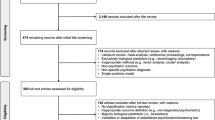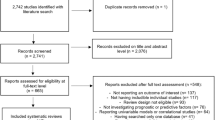Abstract
Prognosis is a core concept in medicine. It is a prerequisite for the clinical evaluation of spontaneous course and effective treatment. Since the introduction of effective treatment methods in psychiatry, interest in prediction of outcome as well as understanding the factors contributing to variability of response to therapy has preoccupied researchers and clinicians. One reason for the limitation of results thus far is the inconsistent conceptual and methodological foundation of research.
Access this chapter
Tax calculation will be finalised at checkout
Purchases are for personal use only
Preview
Unable to display preview. Download preview PDF.
Similar content being viewed by others
References
Alpert M (1985) The signs and symptoms of schizophrenia. Compr Psychiatry 26:103–112.
Awad AG, Hogan TP (1985) Early treatment events and prediction of response to neuroleptics in schizophrenia. Prog Neuropsychopharmacol Biol Psychiatry 9:585–588.
Awad AG (1989) Drug therapy in schizophrenia: variability of outcome and prediction of response. Can J Psychiatry 34:711–720.
Awad A (1992) Quality of life of schizophrenic patients on medications and implications for new drug trials. Hosp Commun Psychiatry 43:262–265.
Bartko G, Herczeg I, Bekesy M (1987) Predicting outcome of neuroleptic treatment on the basis of subjective response and early clinical improvement. J Clin Psychiatry 48:363–365.
Birnbaum K (1923) Der Aufbau der Psychose. Grundzüge der psychiatrischen Strukturanalyse. Springer, Berlin.
Carpenter WT, Heinrichs DW, Hanlon TE (1981) Methodologic standards for treatment outcome research in schizophrenia. Am J Psychiatry 138:465–471.
Clements K, Turpin G (1992) Vulnerability models and schizophrenia: the assessment and prediction of relapse. In: Birchwood M, Tarrier N (eds) Innovations in the psychological management of schizophrenia. Wiley, Chichester New York Brisbane Toronto Singapore, pp 21–47.
Dewey SL, Smith GS, Logan J, Brodie JD, Fowler JS, Wolf AP (1993) Striatal binding of the PET ligand 11C-Raclopride is altered by drugs that modify synaptic dopamine levels. Synapse 13:350–356.
Engel GL (1980) The clinical application of the bio-psycho-social model. Am J Psychiatry 137:535–544.
Frank E, Prien RF, Jarrett RB, Keller MB, Kupfer DJ, Lavori PW, Rush J, Weissman MM (1991) Conceptualization and rationale for consensus definitions of terms in major depressive disorder. Remission, recovery, relapse, and recurrence. Arch Gen Psychiatry 48:851–855.
Freed WJ (1988) The therapeutic latency of neuroleptic drugs and nonspecific postjunctional supersensitivity. Schizophr Bull 14:269–277.
Gaebel W, Pietzcker A, Baumgartner A (1986) 3-Year follow-up of schizophrenic patients — outcome dimensions and neuroleptic treatment. Pharmacopsychiatry 19:208–209.
Gaebel W, Pietzcker A, Ulrich G, Schley J, Müller-Oerlinghausen B (1988) Predictors of neuroleptic treatment response in acute schizophrenia. Pharmacopsychiatry 21:384–386.
Gaebel W, Renfordt E (eds) (1989) Objective methods for behavioral analysis in psychiatry and psychopharmacology — examples and concepts. Pharmacopsychiatry 22[Suppl]:1–50.
Gaebel W, Müller-Oerlinghausen B, Schley J (1992) Early serum levels of neuroleptics do not predict therapeutic response in schizophrenia. Prog Neuropsychopharmacol Biol Psychiatry 16:891–900.
Gaebel W (1993) The importance of non-biological factors in influencing the outcome of clinical trials. Br J Psychiatry 163[Suppl 22]:44–50.
Gaebel W, Frick U, Köpeke W, Linden M, Müller P, Müller-Spahn F, Pietzcker A, Tegeler J (1993) Early neuroleptic intervention in schizophrenia: are prodromal symptoms valid predictors of relapse? Br J Psychiatry 163[Suppl 21]:8–12.
Goodman A (1991) Organic unity theory: the mind-body problem revisited. Am J Psychiatry 148:553–563.
Helmchen H, Gaebel W (1987) Strategies of clinical research on neurobiological determinants of psychosis. Psychiatr Dev 5:51–62.
Hogarty GE, Goldberg SC, Collaborative Study Group (1973) Drug and sociotherapy in the aftercare of schizophrenic patients. Arch Gen Psychiatry 28:54–64.
Hsiao JK, Bartko JJ, Potter WZ (1989) Diagnosing diagnoses. Receiver operating characteristic methods and psychiatry. Arch Gen Psychiatry 46:664–667.
Hyman SE, Nestler EJ (1993) The molecular foundations of psychiatry. American Psychiatric Press, Washington London.
Lieberman JA, Kane JM, Sarantakos S, Gadeleta D, Woerner M, Alvir M, Ramos-Lorenzi J (1987) Prediction of relapse in schizophrenia. Arch Gen Psychiatry 44:597–603.
May PRA, Van Putten T, Yale C, Potepan P, Jenden DJ, Fairchild MD, Goldstein MJ, Dixon WJ (1976) Predicting individual responses to drug treatment in schizophrenia: a test dose model. J Nerv Ment Dis 162:177–183.
May PRA, Goldberg SC (1978) Prediction of schizophrenic patients’ response to pharmacotherapy. In: Lipton MA, Dimascio A, Killam KF (eds) Psychopharmacology: a generation of progress. Raven Press, New York, pp 1139–1153.
May PRA, Van Putten T, Yale C (1980) Predicting outcome of antipsychotic drug treatment from early response. Am J Psychiatry 137:1088–1089.
Möller HJ, Kissling W, Zerssen von D (1983) Die prognostische Bedeutung des frühen Ansprechens schizophrener Patienten auf Neuroleptika für den weiteren stationären Behandlungsverlauf. Pharmacopsychiatry 16:46–49.
Nedopil N, Rüther E (1981) Initial improvement as predictor of outcome of neuroleptic treatment. Pharmacopsychiatry 14:205–207.
Nuechterlein KH (1987) Vulnerability models for schizophrenia: state of the art. In: Häfner H, Gattaz WF, Janzarik W (eds) Search for the causes of schizophrenia. Springer, Berlin Heidelberg New York, pp 297–316.
Pickar D (1988) Perspectives on a time-dependent model of neuroleptic action. Schizophr Bull 14:255–268.
Pietzcker A, Gaebel W, Köpcke W, Linden M, Müller P, Müller-Spahn F, Tegeler J (1993) Continuous vs intermittent neuroleptic longterm treatment in schizophrenia — results of a German multicenter study. J Psychiatr Res 27:321–339.
Selbach H (1961) Über die vegetative Dynamik in der psychiatrischen Pharmakotherapie. Dtsch Med J 16:511–517.
Strauss JS, Carpenter WT (1974) The prediction of outcome in schizophrenia. II. Relationships between predictor and outcome variables. Arch Gen Psychiatry 31:37–42.
Van Praag HM, Kahn RS, Asnis GM et al. (1987) Denosologization of biological psychiatry or the specificity of 5-HT disturbances in psychiatric disorders. J Affect Disord 13:1–8.
Van Putten T, May PRA (1978) Subjective response as a predictor of outcome in pharmacotherapy. Arch Gen Psychiatry 35:477–480.
Woggon B, Baumann U (1983) Multimethodological approach in psychiatric predictor research. Pharmacopsychiatry 16:175–178.
Author information
Authors and Affiliations
Editor information
Editors and Affiliations
Rights and permissions
Copyright information
© 1994 Springer-Verlag Wien
About this paper
Cite this paper
Gaebel, W. (1994). Prediction research of outcome in neuroleptic treatment — definitions and concepts. In: Gaebel, W., Awad, A.G. (eds) Prediction of Neuroleptic Treatment Outcome in Schizophrenia. Springer, Vienna. https://doi.org/10.1007/978-3-7091-6636-9_2
Download citation
DOI: https://doi.org/10.1007/978-3-7091-6636-9_2
Publisher Name: Springer, Vienna
Print ISBN: 978-3-211-82602-7
Online ISBN: 978-3-7091-6636-9
eBook Packages: Springer Book Archive




